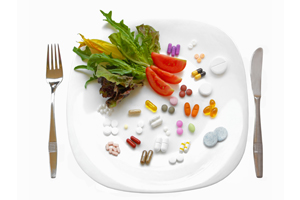The Unintended Consequences of the Proposed Non-GMO Labeling Laws
Author: Dr. Stephen Chaney
 Post Foods recently announced that their Grape Nuts cereal will be completely non-GMO. General Foods followed suit by announcing that their Original Cheerios will also be non-GMO. That’s good news, right?
Post Foods recently announced that their Grape Nuts cereal will be completely non-GMO. General Foods followed suit by announcing that their Original Cheerios will also be non-GMO. That’s good news, right?
Maybe, but it turns out that the new non-GMO Grape Nuts will no longer contain vitamins A, D, B12 or riboflavin, and the amount of riboflavin in a serving of Cheerios decreased from 25% of the daily recommended value (DV) to 2% of the DV.
The cereal manufacturers claim that their new cereals are more wholesome, but one nutrition expert said “The new products are arguably less healthy given their lower vitamin content.”
I’ve never been one to claim that throwing a few vitamins into a serving of cereal turns it into a nutrition powerhouse, but the decreased vitamin content of the new non-GMO cereals does raise a few questions.
- Why were the vitamins removed?
- Did it have anything to do with the cereals being non-GMO?
- Does this mean that the non-GMO processed foods of the future will be less nutritious than the foods they replace?
The cereal manufacturers were mum when asked these questions, so we will need to rely on some scientific sleuthing and a bit of intuition to get the answers.
The Flaw in The Proposed Non-GMO Labeling Laws
I first discussed this topic a few months ago in a “Health Tips From The Professor” article titled “When is GMO Non-GMO?” I received a lot of irate comments from people who take every word on the non-GMO websites and videos as the gospel truth. (The professor has never been one to shy away from controversy when he sees claims that aren’t based on good science.)
However, I think my article was misunderstood by some of my readers, so let me review my conclusions briefly:
- There are definitely environmental concerns around the widespread use of GM crops – especially those that allow heavy pesticide and herbicide usage.
- There are potential health concerns related to the consumption of unprocessed GM foods and proteins derived from GM foods – although those heath concerns have been blown way out of proportion in the media.
If the proposed Non-GMO labeling laws stopped there, they would be scientifically justified. But they go one step further by requiring that processed foods labeled as non-GMO cannot contain any ingredient obtained from a GM source. There is no scientific justification for this.
- Nutrients (sugars, oils & vitamins) derived from GM sources are chemically and biologically indistinguishable from those same nutrients derived from non-GMO sources.
The intentions of the proposed non-GMO labeling laws are good, but whenever you go beyond what good science supports there are often unintended consequences – such as the vitamin-depleted non-GMO cereals that the food manufacturers have just announced.
Will Non-GMO Foods Be Less Nutritious?
 To understand the answer to that question, let’s look at what probably happened to the vitamins in the non-GMO cereals.
To understand the answer to that question, let’s look at what probably happened to the vitamins in the non-GMO cereals.
In today’s world many vitamins are purified from genetically modified microorganisms – bacteria & yeast that have been modified to overproduce certain vitamins. In evaluating the significance of that statement, here are a few facts to consider:
1) We have gotten vitamins from these sources for many years.
- B vitamins have been obtained from yeast for at least a hundred years.
- A significant portion of the vitamins we absorb on a daily basis are made by bacteria in our gut.
2) The only difference today is that these microorganisms have been genetically modified to overproduce the vitamins.
3) These are naturally sourced vitamins.
- The microorganisms are the same ones that have provided these vitamins for generations.
- The enzymes used by the microorganisms to make the vitamins are the same.
4) There is no downside to the use of GM organisms as a source of natural vitamins.
- There is no environmental risk from the use of these GM microorganisms. They don’t contain any dangerous genes that could wreak havoc if they escaped from the food processing plants.
- Because the purified vitamins are indistinguishable from those obtained from non-GMO sources, there are also no health risks.
5) The advantage of using these GM organisms is clear. It substantially lowers the cost of vitamins and allows them to be used in the mass market – for example, in popular breakfast cereals.
6) Most food manufacturers can’t simply use non-GMO sourced vitamins and raise their prices.
- A recent poll showed that 53% of Americans prefer non-GMO foods, but only 11% are willing to pay more for those foods
What Does the Future Hold?
Even though they are scientifically flawed, the proposed non-GMO labeling laws will probably become the law in several states in the near future. (Good science has never played much of a role in political decisions.)
Currently, there simply aren’t enough non-GMO vitamins available to supply the mass market – even if price were no concern. So, in the short term, many non-GMO processed foods are likely to be less nutritious than the foods they will replace – as we just saw with Grape Nuts and Cheerios.
However, most people feel that American ingenuity and the law of supply and demand will eventually result in a bigger supply of reasonable priced non-GMO vitamins. When that happens non-GMO processed foods will be just as nutritious as the older GM versions.
However, at this point nobody knows how long that will take.
The Bottom Line:
1) There is a scientific basis for environmental and potential health concerns regarding genetically modified whole foods and the protein extracted from these foods.
2) However, proposed non-GMO labeling laws would require that a processed food be labeled as genetically modified if it contains any nutrient purified from a genetically modified organism.
3) There is no scientific justification for this requirement. Purified vitamins from GM and non-GM microorganisms are chemically and biologically indistinguishable. Furthermore, the GM microorganisms used to produce the vitamins pose no environmental or health risks.
4) Non-GMO vitamins (vitamins prepared from non-GMO microorganisms) are currently in short supply and are very expensive compared to vitamins prepared from GM microorganisms.
5) Consequently, the unintended consequence of these proposed non-GMO labeling laws will likely be that many of the new non-GMO processed foods will contain fewer vitamins and, therefore, will be less nutritious than the foods they replace – at least in the short term. The new non-GMO Grape Nuts and Cheerios may be just the tip of the iceberg.
These statements have not been evaluated by the Food and Drug Administration. This information is not intended to diagnose, treat, cure or prevent any disease.




